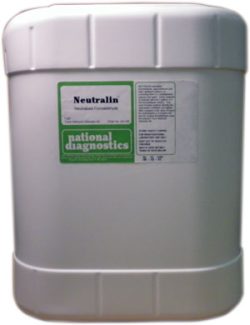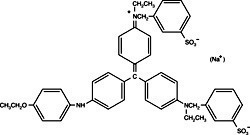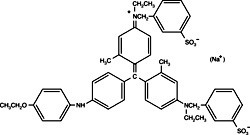Histology
Neutralin
$72.00
Size: 5 Gallon Pail
- Neutralizes Formaldehyde, Glutaraldehyde, and other Aldehyde Solutions
- Convenient, Safer Disposal
Description
Size: 5 Gallon Pail
- Neutralizes Formaldehyde, Glutaraldehyde, and other Aldehyde Solutions
- Convenient, Safer Disposal
Neutralin is a convenient, cost-effective method for the disposal of hazardous formaldehyde, glutaraldehyde, and other aldehyde solutions. Neutralin converts hazardous aldehydes into a nonhazardous, noncorrosive, nontoxic polymer and water. The polymer produced is not a hazardous waste (as defined by United States Title 40 Code of Federal Regulations (40 CFR 261.24(a)). Neutralin reduces disposal costs and contributes to a safer work environment.
Simply pour used aldehyde solutions into the five-gallon pail containing Neutralin and agitate. Neutralization occurs overnight without additional steps or decants. Neutralin is supplied with a Trace Aldehyde Detection Kit, which enables testing of the waste solutions to ensure a lack of residual aldehydes. Neutralin is prepacked and ready to receive five gallons of 4% formaldehyde (10% formalin) solutions.
Additional information
| Weight | 16 lbs |
|---|---|
| Dimensions | 20 × 21 × 24 in |
Protocol
Neutralin can neutralize your aldehyde solutions with its easy, safe process. It is possible for used aldehyde solutions to be self-neutralized within one day with Neutralin.
PROCEDURE
- Pour up to five gallons of your used aldehyde solution into the Neutralin pail. Twist or shake the container in order for the pail’s contents to agitate.
- Let the solution to neutralize overnight. The solution will form a clear subtance on top (Neutralin Supernatant) and white residue.
- Insert 0.5 ml of the Aldehyde Test Reagent (included) and 0.5 ml deionized water into a clear, small test tube. Take 0.05 ml of the Neutralin Supernatant from the pail and add to the test tube.
- Cap the test tube and invert several times. Allow the solution to settle for five minutes.
At this point the solution in the test tube should either be clear or magenta, which will determine the next steps.
Clear
Your aldeyhyde solution has successfully been neutralized. The polymer in the pail is not classified as a hazardous waste* and no special disposal considerations need to be considered.
Magenta
Formaldehyde is still present in the Neutralin pail. Wait overnight and reevaluate the solution the next day.
If the solution is now clear the aldehyde in the pail was successfully neutralized. However, if the solution is still magenta-colored it was likely overloaded with formaldehyde. Decant the Neutralin Supernatant into an unused Neutralin pail and rinse the white residue in the original pail with water. Decant the new Neutralin container. Agitate this mixture and repeat the above procedure.
The Trace Aldehyde Detection Kit provides enough material for up to three tests.
* As defined by United States Code Title 40 Code of Federal Regulations (40 CFR 261.24(a)).
Safety Overview
Safety Summary (see SDS for complete information before using product):
Appearance and Odor
White crystals or white powder
EMERGENCY OVERVIEW – IMMEDIATE HAZARD
CAUSES IRRITATION TO SKIN, EYES, AND RESPIRATORY TRACT. HARMFUL IF SWALLOWED OR INHALED.
- Working Safely with Fixatives
- Tissue Processing for Electron Microscopy
- The Chemistry of Dyes and Staining
- Suggested procedures for processing fixed tissue
- Staining Tissue Sections for Electron Microscopy
- Staining Procedures
- Sectioning Tissue for Electron Microscopy
- Sectioning
- Overview of the Paraffin Technique
- Overview of Fixation
- Non-Aldehyde Fixatives
- Mounting Tissue Sections
- Immunohistochemistry
- Fixing Tissue for Electron Microscopy
- Factors Affecting Fixation
- Embedding
- Electron Microscopy
- Detection Systems in Immunohistochemistry
- Dehydration
- Decalcifying Tissue for Histological Processing
- Clearing Tissue Sections
- Artifacts in Histologic Sections
- Antibody Binding
- Aldehyde Fixatives





